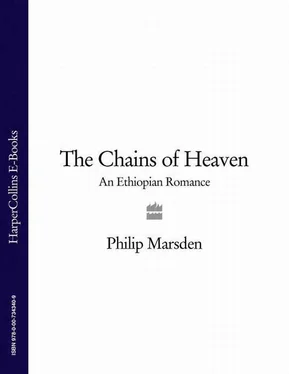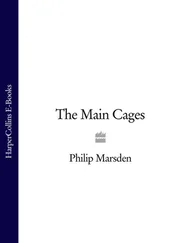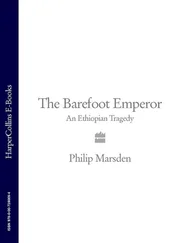That afternoon in a flophouse near Giorgis cathedral Teklu and I lay on the twin beds and, while rain fell like gravel on the corrugated iron roof, I let him conjure up another country. He spoke of rock-cut churches among fairytale peaks, monasteries accessible only by rope or chain, treasures hidden in caves of gold and holy men who would vanish even as you talked to them. He spoke of his native Tigray and his own local town of Aksum where miracles happened every day and a caste of mute monks guarded the true Ark of the Covenant.
‘If you try and get close,’ he laughed, ‘they kill you!’
‘Can we go to Tigray?’ I asked.
He politely shook his head.
The few expats in Addis were less forgiving: ‘You’re a damned idiot, boy—you come here expecting a nice little holiday. This country is a living hell !’
Over the coming days, it became obvious even to me. Addis Ababa was paralysed with fear. Not all the figures lying on the edge of the road were sleeping. The Red Terror, when thousands of counter-revolutionaries were shot, was over—but the disappearances and killings continued. Rumours of patrols swept through the shanty like the afternoon rains sending everyone scurrying for shelter. And over it all presided the man who gazed down from the wall of every office—Colonel Mengistu Haile-Mariam.
For days, Teklu and I did the rounds of ministries trying to get permission to travel. We met only the mumbles and head-shakes of frightened officials. After a week, I decided to cut my losses and return home. I went back to Wonderland Tours. Dr Mengesha was there. He heard out my story and saw my frustration.
‘Ethiopia is a wonderful country, you know.’
I shrugged. I was in no mood to agree.
He tapped a pencil on his desk and said, ‘Come back this afternoon at four.’
I still don’t know what he did, nor why he chose to stick his neck out for a useless and ignorant farenj. But later that day he handed me an envelope and again said: ‘Congratulations!’ In it were all the right papers with all the right stamps. He spread out a map and explained our route. He took Teklu and me to the store and handed us a tent, a stove—and lifejackets. He was sending us to Lake Tana. Teklu grinned at me and winked. In that cowed city, Mengesha and Teklu seemed the only people who were truly alive.
So we did go north. We spent days on the lake, walking its bouldery shores, paddling from island to island on papyrus rafts, visiting monasteries. We watched the islanders spear catfish in the shallows. We asked when the last foreigners were there and they said: ‘Never.’ We almost drowned when a sudden storm caught us on the lake. ‘It is a beautiful adventure!’ Teklu was a man whose enjoyment grew in proportion to the level of danger.
Teklu and I exchanged letters for months afterwards. ‘Dr Mengesha says hello and do not forget us.’ How could I? Ethiopia had gripped me by the shoulders and shaken me awake. ‘Not too many tourists these days,’ Teklu wrote, without irony. He told me he had taken some Soviet bigwigs down the Omo river. A hippo overturned their boat. ‘We had a beautiful adventure!’ Then the letters stopped.
At the time few people were going to Ethiopia and I was able to indulge the illusion that I was something of an expert. I wrote about it, lectured about it, bored anyone who cared to listen. Ethiopia was my country. It was the central column of a shaky structure—life in my early and mid-twenties.
I went back a few years later. It was the rainy season again; torrents of water sluiced down Africa Avenue and into Revolution Square. LONG LIVE PROLETARIAN INTERNATIONALISM! was still there, as was the triumvirate of beards. I found myself again outside Wonderland Tours.
This time the plate-glass was daubed with swirls of white paint; traces of the name could just be read on the signboard. A paper seal covered the door and the jamb, with a purple ministry stamp. Wonderland Tours had gone. No one could tell me what had happened to Dr Mengesha or to Teklu.
After another three years I returned. I travelled in the south and east. I revisited Lake Tana and Gondar. But no armtwisting, no amount of lobbying could yield permission to see Lalibela or Aksum or Tigray, to reach the mountaintop monasteries of the north, the rebel heart of the old country. Nor was anyone forthcoming about Dr Mengesha and Teklu. The country was still in Colonel Mengistu’s grip, and I developed a perverse obsession with him. I listened to the whispered atrocities of war in Tigray and Eritrea, of the meetings when Mengistu himself would shoot his failing generals. I sought out dissidents, heard hinted fantasies of coup and assassination. But it was wishful thinking. I left Ethiopia sickened by its cruelty and torpor, convinced that Mengistu and the Derg would be in power for a generation or more.
For ten years I travelled. I roamed the Middle East and the regions of the old Soviet bloc. I never spent more than a few months in the same place. I found myself drawn to remote and restive minorities, to the passionate fringes of religious belief. I am convinced now that if I had not chosen Ethiopia, if I had not met Teklu, if Dr Mengesha had not procured the papers that afternoon in 1982, I would not have lived the life I have, would not have travelled quite so obsessively, and would never have begun to write.
All writing careers begin with a single sentence. Mine was: Teklu was a Tigrayan. (Actually it was Telku waS a Tigtayam, but a little Tipp-Ex remedied that.) I read it aloud— Teklu was a Tigrayan… It had a natural rhythm. It had alliteration, a declarative simplicity. I pictured prizes, heard plaudits, projected the entire range of human experience flowing through my fingertips. It was a long time before I wrote another sentence. When after five years the sentence was finally published, Mengistu was still in power and it read, for Teklu’s safety: Yared was a Tigrayan. The book that contained it was not a great success.
One spring I was in Armenia. Snow shone on the peaks of Zangezur, walnut trees were bursting into life and Grad missiles were falling on the town of Goris. The first of the post-Soviet wars was beginning—just as another was ending in the Horn of Africa. Mengistu’s military machine had been propped up for years by the Soviet Union, but now his brand of hard-line Leninism was out of fashion. The removal of Moscow’s support tipped the balance in the rebels’ favour. In that crumbling southern corner of the Soviet Union I crouched in the doorways of makeshift shelters listening to their progress on a short-wave radio. The TPLF and its allies were fighting along the shores of Lake Tana, at Bahir Dar. They were marching on Addis Ababa. Their tanks were entering Revolution Square. Then they were firing on the Ghibbi, the palace where the Derg was making a final stand. Mengistu had fled.
Twelve years passed. I was involved in other places, pursuing other ideas. But Ethiopia was where it all began—and it was unfinished business. At the age of forty-two, I went back.
The arch had gone. Above the entrance to Revolution Square there was no more LONG LIVE PROLETARIAN INTERNATIONALISM! The hoarding of Marx, Lenin and Engels had been replaced by one which warned of the dangers of HIV/Aids. Stencilled on the plate-glass front of Wonderland Tours was the silhouette of a woman’s head and: LUCY UNI-SEX HAIR SALON. The door opened on a late-afternoon hubbub of coiffurerie. The air was steamy with hair-washing. Along one wall ran a line of space-helmet driers; two or three white-coated women were giving manicures. But yes, this was the place—there was the mezzanine where Dr Mengesha had had his office; and that was where his wife Almaz sat doing the accounts. The back room had been the equipment store, where Mengesha had handed Teklu and me the equipment for Lake Tana. Now it was the Gentleman Salon.
Читать дальше











